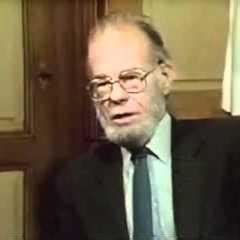A Quote by Adolph Guggenbuhl-Craig
Marriage is not comfortable and harmonious. Rather it is a place of individuation where a person rubs up against oneself and against the partner, bumps up against the person in love and in rejection, and in this fashion learns to know oneself, the world, good and evil, the heights and the depths.
Related Quotes
Against the suffering which may come upon one from human relationships the readiest safeguard is voluntary isolation, keeping oneself aloof from other people. The happiness which can be achieved along this path is, as we see, the happiness of quietness. Against the dreaded external world one can only defend oneself by some kind of turning away from it, if one intends to solve the task by oneself.
We're taking action against evil people. Because this great nation of many religions understands, our war is not against Islam, or against faith practiced by the Muslim people. Our war is a war against evil. This is clearly a case of good versus evil, and make no mistake about it - good will prevail.
I couldn't possibly explain why the common person would be against something like that. It's all rooted in sexual hang-ups. The whole institution of marriage itself really has no place in a progressive society. I don't know why anyone would want to get married heterosexually, so why they'd be against homosexual marriage is flummoxing. I only use that word when I'm talking to someone from the British press.
In my work I have chosen the positive approach. I never think of myself as protesting against something, but rather as witnessing for harmonious living. Those who witness for, present solutions. Those who witness against, usually do not - they dwell on what is wrong, resorting to judgment and criticism and sometimes even name-calling. Naturally, the negative approach has a detrimental effect on the person who uses it, while the positive approach has a good effect
Imagine that the world is made out of love. Now imagine that it isn’t. Imagine a story where everything goes wrong, where everyone has their back against the wall, where everyone is in pain and acting selfishly because if they don’t, they’ll die. Imagine a story, not of good against evil, but of need against need against need, where everyone is at cross-purposes and everyone is to blame.
Everything that you are against works against you. Everything that you are against can be restated in a way that puts you in support of something. When you are able to state what you are for rather than what you are against, you are focusing on the potential for positive change. Once that is in place, you will find whatever you are focusing on expanding.
































